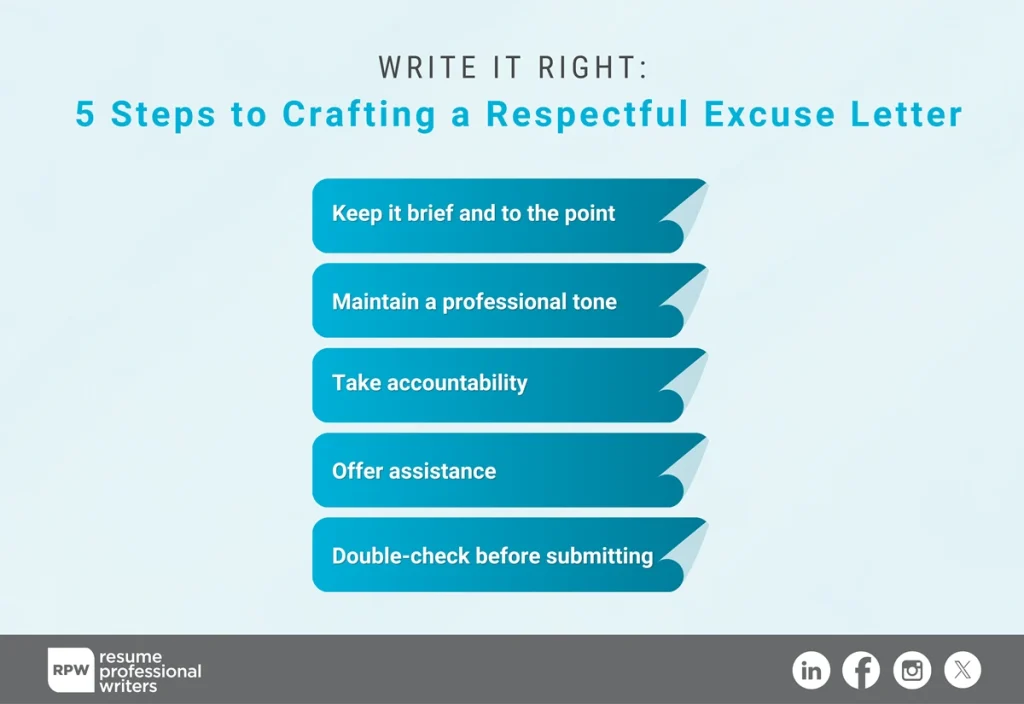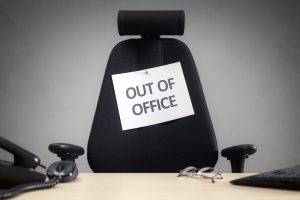Admit it: Once in your life, you’ve found yourself wanting to escape the hustle and bustle of everyday life. Yes, that’s natural. Even in our professional lives, unforeseen circumstances can sometimes arise, necessitating our absence from work. Whether work absence is due to illness, family emergencies, or personal reasons, it’s crucial to communicate our absence professionally through a well-crafted absence excuse letter.
In this blog, our career experts have prepared a comprehensive guide to personalized excuse letters that aims to help you navigate the nuances of writing an effective and formal excuse letter for work. We’ve also laid down practical tips that allow you to maintain professionalism and clarity in every word. Let’s go.

What is an Excuse Letter for Work?
An excuse for absence letter for work is a formal means of communication between you and your employer, explaining why you can’t be at work. It demonstrates your professionalism and commitment to clear communication during challenging times such as illness or emergencies, ensuring your absence is understood and respected. An effective absence note should be honest, concise, and free of personal details, providing a clear reason for your absence.
When you write an excuse letter for missing work, you extend the bridge that maintains trust and understanding in the workplace. Indeed, it shows your reliability and accountability, even in the face of a situation you otherwise would have preferred to be more amenable for work. By proactively communicating your absence and its reasons, you strengthen relationships with colleagues and superiors, emphasizing your dedication to your role and the organization’s values.

Key Elements of an Effective Excuse Letter
After understanding the importance of a well-written excuse letter, it’s important to know the key elements that contribute to its efficacy. By incorporating these essential components, you can ensure that your work excuse letter is not only professional but also clear and convincing.
Let’s explore these elements in greater detail to help you craft a comprehensive excuse letter for being absent that clearly communicates your absence and leaves no room for losses in translation:
- Date: Begin your letter with the current date to provide a reference point for when the letter was written.
- Recipient’s Information: Address the letter to the appropriate individual, such as your employer or manager, including their name, job title, and the company’s address.
- Subject Line: Provide a brief and clear subject line that summarizes the purpose of the letter, such as “Excuse Letter for Absence.”
- Greeting: Start your letter with a formal greeting, addressing the recipient by their title and last name (e.g., “Dear Mr. Smith”).
- Introduction: Open your letter with a brief introduction stating the purpose of your communication and acknowledging any inconvenience your absence may cause.
- Reason for Absence: Clearly state the reason for your absence, whether it’s due to illness, family emergency, personal reasons, or a pre-planned absence. Provide sufficient details to convey the seriousness and legitimacy of your situation.
- Duration of Absence: Specify the dates or duration of your absence, including the start date and, if known, the expected return date. This helps your employer plan accordingly.
- Documentation (if applicable): If your absence requires supporting documentation, such as a doctor’s note for illness or a legal document for personal reasons, include it with your letter.
- Contact Information: Provide your contact information, such as your phone number or email address, so that you can be reached if needed during your absence.
- Business Letter Format: Ensure that your letter adheres to a business letter format. This is essential for professionalism and alignment with company guidelines, serving as a formal communication tool regarding your time off from work.
- Closing: End your letter with a polite closing, such as “Sincerely” or “Best Regards,” followed by your full name and signature.
Types of Excuse Letters
Excuse letters come in various forms, each tailored to specific situations and needs. Understanding the different types can help you choose the most appropriate one for your circumstances. Here are some common types of excuse letters:
- Medical Excuse Letters: These are used to explain absences due to medical reasons, such as illnesses, injuries, or scheduled medical appointments. They often require supporting documentation, like a doctor’s note, to validate the absence.
- Family Emergency Excuse Letters: These letters are necessary when you need to explain an absence due to a family emergency, such as a family member’s illness or hospitalization. They convey the urgency and importance of your presence with your family during critical times.
- Personal Excuse Letters: These are used for absences due to personal reasons, such as attending a family event or handling personal matters. While they may not always require detailed explanations, it’s important to provide enough context to justify the absence.
- Business Excuse Letters: These letters are relevant for absences due to business-related activities, such as attending a conference, meeting, or training session. They highlight the professional nature of the absence and often include details about the event.
- School Excuse Letters: These are used to explain absences related to educational commitments, such as attending a school event or working on a project. They are typically addressed to school authorities and provide necessary details about the absence.
Each type of excuse letter has unique characteristics and requirements, making it essential to choose the right one for your specific situation.
Examples of Excuse Letters:
To provide further information and clarity, let’s explore sample templates for various scenarios below:
Excuse Letter for Work Involving Illness
[Your Name]
[Your Address]
[City, State Zip Code]
[Email Address]
[Phone Number]
[Date]
[Employer's Name]
[Company Name]
[Company Address]
[City, State Zip Code]
Dear [Employer's Name],
I am writing to inform you that I am unable to come to work today due to an illness. While I was supposed to report for work today, I unfortunately woke up with a severe migraine and accompanying nausea. This would make it impossible for me to perform my duties efficiently. I apologize for any inconvenience my absence may cause, and I assure you that I am taking necessary steps to recover quickly.I have attached a doctor's note confirming my illness and will keep you updated on my condition. Thank you for your understanding and support during this time.
Sincerely,
[Your Name]Excuse Letter for Work Involving Family Emergency
[Your Name]
[Your Address]
[City, State Zip Code]
[Email Address]
[Phone Number]
[Date][Employer's Name]
[Company Name]
[Company Address]
[City, State Zip Code]
Dear [Employer's Name],
I regret to inform you that I am unable to attend work today due to a family emergency. My [family member] has been hospitalized, and I need to be with them during this difficult time. I understand the importance of my responsibilities at work, and so I assure you that I'll do whatever I can, including handling any urgent matters remotely, if needed.I apologize for any disruption my absence may cause and appreciate your understanding during this challenging period. Please let me know if there are any specific tasks or deadlines that require immediate attention.
Sincerely,
[Your Name]Excuse Letter for Work Involving Personal Reasons
[Your Name]
[Your Address]
[City, State Zip Code]
[Email Address]
[Phone Number]
[Date]
[Employer's Name]
[Company Name] [
Company Address]
[City, State Zip Code]
Dear [Employer's Name],
I am writing to request a leave of absence from work due to personal reasons. Recently, I have been dealing with [explain the situation briefly], and I need some time to address these matters better. I understand the impact of my absence on the team and will ensure that all pending tasks are completed before my departure.I apologize for any inconvenience my absence may cause and am willing to provide additional details if necessary. Thank you for your understanding and support during this time.
Sincerely,
[Your Name]Excuse Letter for Work Involving Pre-planned Absence
[Your Name]
[Your Address]
[City, State Zip Code]
[Email Address]
[Phone Number]
[Date]
[Employer's Name]
[Company Name]
[Company Address]
[City, State Zip Code]
Dear [Employer's Name],
I am writing to inform you in advance of my upcoming absence from work. I have [explain the reason for the absence, such as a scheduled medical appointment, family event, or personal commitment] on [date(s)], and I wanted to give you sufficient notice to make any necessary arrangements.I will ensure that all my pending tasks are completed and delegated before my departure, and I will be available through email or phone for any urgent matters that may arise during my absence. Thank you for your understanding and support. Please let me know if there are any specific procedures I need to follow or if you require any additional information.
Sincerely,
[Your Name]Using an Excuse Letter Template
An excuse letter template can be a valuable tool for drafting a well-structured and effective excuse letter. It provides a basic outline that you can customize to fit your specific needs, ensuring your letter is professional and comprehensive. Here are some tips for using an excuse letter template:
- Choose a Relevant Template: Select a template that closely matches your situation, whether it’s for a medical absence, family emergency, or personal reason. This ensures the format and content are appropriate for your needs.
- Customize the Template: Personalize the template by adding specific details about your situation. Include relevant dates, times, and reasons for your absence to make the letter more authentic and credible.
- Proofread Carefully: Before submitting your letter, proofread it to ensure there are no grammatical errors or typos. A polished and error-free letter reflects your professionalism and attention to detail.
- Maintain a Professional Tone: Use formal language and a professional tone throughout the letter. Avoid slang or overly casual expressions to ensure your letter is taken seriously.
- Include Necessary Details: Make sure your letter includes all essential information, such as the duration of your absence and any supporting documentation if required.
By using an excuse letter template, you can create a well-written and effective excuse letter that communicates your absence clearly and professionally.
Tips for Writing a Professional Excuse Letter for Work
Given the sample templates above, you might think that it’s easy to simply copy and paste depending on what your situation calls for. And while that’s tempting, it’s also critical to note that writing a professional excuse letter requires attention to detail and careful consideration of your wording. Therefore, we strongly encourage you to simply use the samples as a guide and instead write your own formal letter.
Here are 5 essential tips to help you craft a compelling excuse letter that succinctly communicates your unexpected absence while maintaining professionalism:
1. Keep your letter brief and to the point.
Did you know that in cases such as excuse of absence letters, the shorter and more on-point your letter is, the better for everyone involved? Keep that in mind — provide clear and concise explanations for your absence without unnecessary details or embellishments.
2. Maintain a professional tone throughout your letter.
Even if, say, you have a somewhat congenial relationship with your boss, it still pays to avoid slang or overly casual language. Remember, this is formal communication with your employer or manager.
3. Take accountability for the effects your absence may bring.
If your absence causes inconvenience or disruption to work operations, express sincere apologies and assure your employer of your commitment to fulfilling your duties upon your return.
4. Offer assistance or support, if needed.
If there are any tasks or responsibilities that require immediate attention during your absence, offer to assist remotely or delegate tasks to ensure continuity of work.
5. Double-check your excuse letter for work before submitting.
Before sending an excuse letter, proofread it carefully to check for any grammatical errors or typos. Ensure that your excuse letter template is polished and professional in its presentation.

Best Practices for Submitting an Excuse Letter
Submitting an excuse letter requires careful consideration to ensure it is well-received and effective. Here are some best practices to follow:
- Submit Promptly: Aim to submit your excuse letter as soon as possible, ideally before your absence or immediately upon your return. This demonstrates your responsibility and respect for your employer or school.
- Use a Professional Tone: Maintain a formal and respectful tone throughout your letter. Avoid using slang or overly casual language, even if you have a friendly relationship with the recipient.
- Include All Necessary Details: Ensure your letter contains all relevant information, such as the dates of your absence, the reason for your absence, and any supporting documentation. This helps the recipient understand and process your request efficiently.
- Proofread Thoroughly: Double-check your letter for any grammatical errors or typos. A well-written and error-free letter reflects your professionalism and attention to detail.
- Keep a Record: Retain a copy of your letter and note the date and time it was submitted. Also, keep track of any responses or acknowledgements from your employer or school for future reference.
By following these best practices, you can ensure that your excuse letter is professional, clear, and effective in communicating your absence.
Crafting the Perfect Excuse Letter: Your Pathway to Professionalism and Trust
Whether you’re a seasoned employee or an entry-level professional who’s eager to get their beak wet, writing an effective excuse letter for work is essential for maintaining professionalism and trust within the workplace. By following the guidelines outlined in this comprehensive guide to drafting excuse letters, you can ensure your absence is communicated clearly and professionally. Don’t hesitate to use the provided example templates and tips to craft your excuse letter with confidence.
For more workplace tips that include writing professional correspondence, check out our library of practical career advice to help you.








